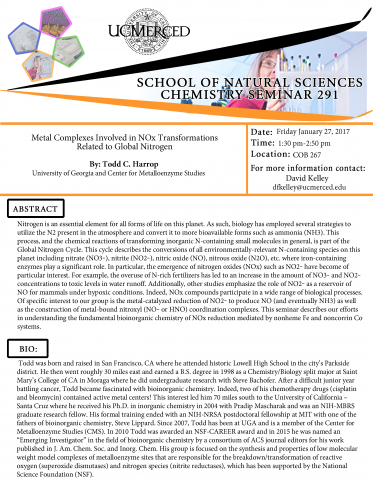
Todd C. Harrop, University of Georgia
Abstract:
Nitrogen is an essential element for all forms of life on this planet. As such, biology has employed several strategies to utilize the N2 present in the atmosphere and convert it to more bioavailable forms such as ammonia (NH3). This process, and the chemical reactions of transforming inorganic N-containing small molecules in general, is part of the Global Nitrogen Cycle. This cycle describes the conversions of all environmentally-relevant N-containing species on this planet including nitrate (NO3‒), nitrite (NO2‒), nitric oxide (NO), nitrous oxide (N2O), etc. where iron-containing enzymes play a significant role. In particular, the emergence of nitrogen oxides (NOx) such as NO2‒ have become of particular interest. For example, the overuse of N-rich fertilizers has led to an increase in the amount of NO3‒ and NO2‒ concentrations to toxic levels in water runoff. Additionally, other studies emphasize the role of NO2‒ as a reservoir of NO for mammals under hypoxic conditions. Indeed, NOx compounds participate in a wide range of biological processes. Of specific interest to our group is the metal-catalyzed reduction of NO2‒ to produce NO (and eventually NH3) as well as the construction of metal-bound nitroxyl (NO‒ or HNO) coordination complexes. This seminar describes our efforts in understanding the fundamental bioinorganic chemistry of NOx reduction mediated by nonheme Fe and noncorrin Co systems.
Flyer File



